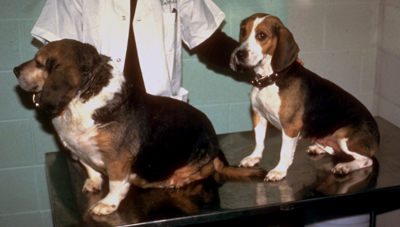What is Canine Autoimmune Thyroiditis?
Canine Autoimmune Thyroiditis is a genetic disease and is the cause of over half the cases of hypothyroidism diagnosed in dogs. While just one individual symptom may not alert you to this significant genetic problem, observing a combination of symptoms should signal the need to further test for autoimmune thyroiditis in dogs. The incidence of autoimmune thyroiditis in males and females is similar. While it is not a life-threatening disease, the quality of the animal's life that's suffering is substandard. The most common clinical symptoms of canine autoimmune thyroiditis are:
- Sluggishness
- Obesity
- Skin disease
- Cold intolerance
- Hair loss
- Weakness
- Poor coat quality
- Infertility
If your dog is exhibiting any of these symptoms of autoimmune thyroiditis, ask your veterinarian to run a test, ask your veterinarian to test for thyroiditis. A simple blood screen is all that is needed for an accurate diagnosis.

On the left is a beagle with hypothyroidism, on the right is a normal beagle.
The Thyroglobulin Autoantibody test can detect autoimmune thyroiditis up to two years before the onset of symptoms. A commercial kit for TgAA analysis is manufactured by Oxford Laboratories, and is available to veterinary laboratories worldwide. The TgAA assay has been recommended by the Orthopedic Foundation for Animals (OFA) for its canine thyroid registry. In the United States and Canada, your veterinarian can have your dog's blood tested by an OFA-approved veterinary laboratory. The OFA registry records and stores data concerning the incidence of autoimmune thyroiditis. The level of thyroid function can be quantified using one of three methods: the T4 (L-thyroxine) test, the canine TSH (Thyroid Stimulating Hormone) test, or the TgAA (Thyroglobulin Auto Antibody) test.
Download our presentation on Canine Autoimmune Thyroiditis: An overview for dog breeders (ppt)
